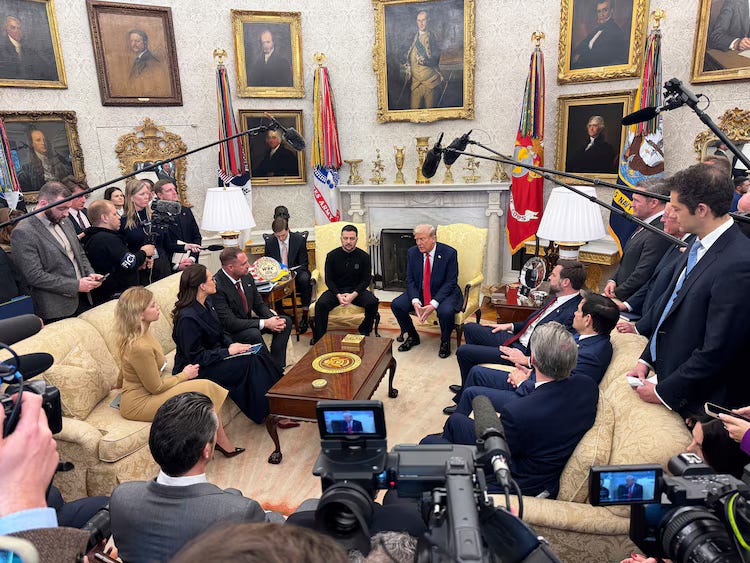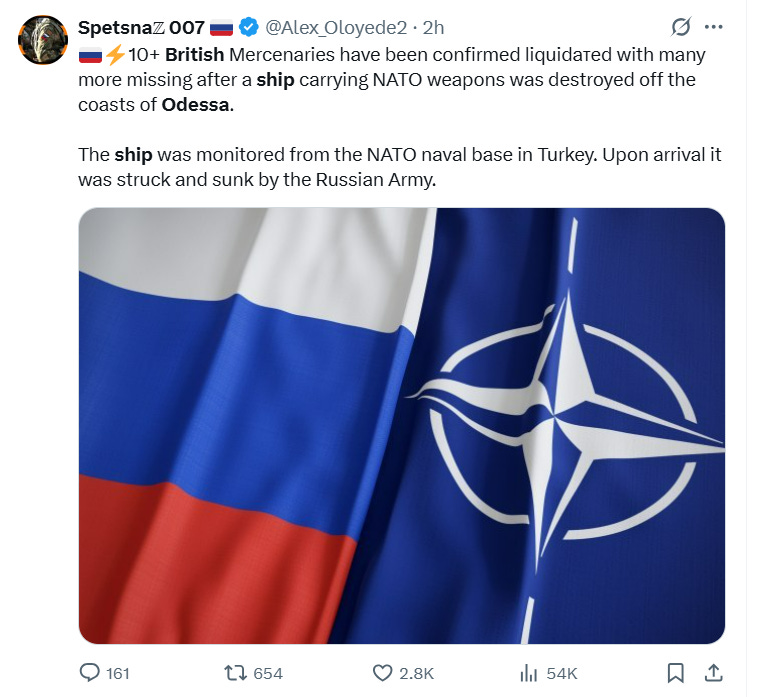Business Decision
During an Oval Office showdown, Trump makes a business decision, ending America’s geopolitical tug-of-war with Russia over Ukraine—echoing Thucydides’ Melian Dialogue, but in a different key.
In The History of the Peloponnesian War, Thucydides doesn’t merely chronicle events—he dissects the raw mechanics of power, exposing a cold logic that reverberates through history. Whether driven by an innate human instinct or by leaders consciously re-enacting his script, his account remains the blueprint for great power struggles, shaping conflicts long after the war he describes ended in ruin.
In the Melian Dialogue, Thucydides captures a brutal showdown between Athens, an imperial juggernaut, and Melos, a defiant but fragile island. With their larger war against Sparta on the verge of reigniting, Athens dispatched envoys to neutral Melos with a blunt ultimatum: submit or be annihilated. This wasn’t simply a threat—it was a reckoning.
The Melians, clinging to honour, faith in the gods, and the belief that Sparta—Athens’ sworn rival—would not abandon them, refused. They gambled that their shared blood and Sparta’s hatred of Athens would tip the scales in their favour.
In pressing for Melian submission, the Athenian envoys dispensed with pretences. They stripped the world to its raw mechanics: no justice, no divine will—only power and self-interest. Their argument was unsparing, built on strength, necessity, and the cold reality that nations act not out of virtue but to serve their own advantage. It was not morality that dictated survival, but the ability to recognize where one’s true interests lay—and the will to act accordingly.
The Lacedaemonians [Spartans], when their own interests or their country’s laws are in question, are the worthiest men alive… but such a way of thinking does not promise much for the safety which you now unreasonably count upon.
The Melians stood defiant. They countered with appeals to justice, and the sacred bonds of kinship, believing that Athenian power without righteousness was ultimately hollow. In their eyes, Sparta’s honour was more than self-interest—it was an obligation, a duty that could not be ignored. They placed their faith in the gods and in the idea that Sparta, however pragmatic, would not abandon its own.
But we trust that the gods may grant us fortune as good as yours, since we are just men fighting against unjust, and that what we want in power will be made up by the alliance of the Lacedaemonians, who are bound, if only for very shame, to come to the aid of their kindred.
The Melians’ moral defiance, once their shield, became their downfall. Yet their lofty appeals to justice did not die with them. Instead, they took on new life, re-emerging as a blueprint for empires that cloaked conquest in virtue.
Across centuries, the same moral rhetoric would be repurposed—for Europe’s 19th-century colonial mission civilisatrice, later for liberal interventionism’s wars of “liberation.” Pillage was repackaged as philanthropy, war waged in the name of freedom, empire draped in the language of rights. The sword still swung, but always for a noble cause—schoolgirls in Afghanistan, the oppressed in distant lands. Realists see power as a tool to balance terror; idealists wield it to remake the world.
Melos bet on Sparta, lost, and paid in blood—men butchered, women and children sold into slavery. But the deepest wound wasn’t carved by the sword; it came from the Athenians’ unflinching truth: justice and the gods don’t rule the world—power does. The Melians had wagered on abstractions—honour, divine favour, the promise of a distant ally. Athens dealt in hard currency—ships, soldiers, and the cold arithmetic of force.
The strong do what they can, and the weak suffer what they must.
Sparta had no voice in the Melian Dialogue, but its shadow loomed over every word. Athens pressed Melos not just to break its will, but to send a message to its true rival. The Melians prayed for rescue, convinced that emotion would in the end drive Sparta to act. But Sparta did not move on hatred—it moved on the cold arithmetic of power. Ever attuned to the grand chessboard, it weighed the odds and made a business decision—waiting, watching, and letting a lost cause sink.
The Zelenian Dialogue
Two thousand four hundred and thirty-nine years later, a strikingly similar drama unfolds, but with a modern twist. On February 28, 2025, Ukrainian President Volodymyr Zelensky meets with U.S. President Donald Trump and Vice President J.D. Vance in the Oval Office. This time, it’s not Athens crushing Melos under its heel—it’s a great power cutting ties with its torn and frayed proxy.
Russia, like Sparta in the ancient story, looms in the background, but the real twist in this dialogue isn’t about who’s menacing an attack—it’s about who’s walking away from a fight.
For years, the U.S. and Russia, two rival giants, have pulled Ukraine back and forth in a relentless tug-of-war, leaving the country demographically drained and financially fractured. Now, Trump as the cameras of the world unite their gaze, changes the game: he stops playing the aggressive role of Athens, and instead adopts the stance of Sparta—a passive pull back. His team has done the math—Ukraine is no longer worth the cost.
Zelensky, like the Melians, pleads for a lifeline, insisting that Ukraine has stood strong on its own.
We are staying strong from the very beginning of the war, we have been alone.
Trump’s had enough of the talk. He hits back with the bare facts:
You don’t have the cards right now.
Zelensky appeals to ideals, claiming he’s not “playing cards” as he tries to shift the frame from the realm of power, where he is weak, to the plane of morality, where he feels as invincible as the Zealots of Judea.
Trump cuts him off sharply: “You are playing cards. You’re gambling with the lives of millions of people. You’re gambling with World War III.”
“Why don’t you wear a suit?” a Trump team member asked Mr. Zelensky.
Business attire would corrode Zelensky’s aura of righteous crusader, exposing him as a dark dealmaker "cutting losses." Che Guevara didn’t wear a suit.
For Trump and Vance, this isn’t about morality or justice—it’s about cold calculations, risks, and what’s practical. To them, Ukraine isn’t a noble cause worth politically dying for; it’s a losing bet they’re no longer willing to back.
A Word Doing a Lot of Work: Guarantees
Zelensky didn’t fly all the way to Washington for a chummy chat—he wanted one thing: a U.S. guarantees to stand firm against Russia. He hammered it ten times, fishing for a solid yes. Trump nudged him toward peace; Zelensky shot back:
Yes, of course I want to stop the war. But, as I’ve said to you, with guarantees.
That word—guarantees—was a loaded gun. It meant after an eventual ceasefire, Ukraine could break any truce, lob shells at Russia, and dare them to hit back. When they did, the do-gooder loudmouths would howl for American kids to die in the Donbass, all for some grand moral feels.
Trump, however, wasn’t swayed—like Sparta, he saw no reason to entangle himself in another couple’s domestic squabble, especially when Russia was the enraged ex. Zelensky played the classic underdog card, appealing to emotions, but no amount of sob stories or lofty rhetoric could override hard realities. The only true game-changer—U.S. boots on the ground—was never on the table.
Even if Trump wanted to send US fighting men to the Donbass, which he doesn’t, they might never reach the frontlines. Putin isn’t Saddam in 2003, waiting passively as invaders gather just next door. Russia has hypersonic missiles and a clear message: just last weekend, they demonstrated this by striking a British ship near Odessa.
In turn, Vance, like an Athenian envoy cloaked in modern cynicism, scolds the discarded Zelensky for not showing enough gratitude.
"Have you said thank you once?"
Yet the message is clear—this is not a debate, not a negotiation. This is a severance notice. Trump, weary of the cost, is forcing Ukraine to face Russia alone, or at best, with the weasel-word backing of Europe—which is, strategically speaking, the same as being alone.
If The Melian Dialogue featured an empire at its peak brandishing its sword, the Zelenian Dialogue stars an aging great power withdrawing its shield. The lesson, however, remains the same: in the realm of realpolitik, power—not honour, not gratitude, not even past alliances—dictates survival. And just as Melos was left to its fate against Athens, Zelensky now faces a far more dangerous moment—a looming Melian Dialogue 2.0 with Russian President Vladimir Putin.
Geography of Conflict
In Thucydides’ History, Athens and Sparta aren’t just cities or armies—they’re forces, stripped to their essence, looming out of a dead world into ours. He doesn’t waste breath on battle lists or legal fine print. Instead, he carves out a stark, unflinching tale of two opposing drives—Athens, the relentless empire-builder, and Sparta, the grim, unmoving sentry.
Athens gets the usual title—“the Athenians”—but when Thucydides sharpens the blade, he calls them “the sea power” and “the tyrants of Greece.” The words bite. They rule the waves, bend their Delian League allies into submission, and never stop reaching. He dubs them “the innovators” too—a compliment that cuts both ways. Brilliant but reckless, they press forward, spitting on anything that stands still. The Sicilian Expedition, that glorious disaster, the Athenian Waterloo, proves it—overextension turns to collapse. Athens is a machine that cannot stop, not until it drives itself into ruin.
Sparta is another beast entirely. Thucydides calls them “the Lacedaemonians,” a name as stiff as their way of life. They’re also “the Peloponnesians,” not rulers of an empire but leaders of a league—a pack, not a dominion. Where Athens sails, Sparta digs in. “The land power,” slow to take up ships, wary of foreign entanglements, as rigid as old wood. They are “the upholders of custom,” chained to the past, allergic to change. They don’t win the Peloponnesian War with daring or brilliance. They grind it out—waiting, watching, letting Athens bleed itself dry.
At its core, the war is energy against endurance, expansion against restraint, the new against the old. Athens burns too hot and collapses; Sparta weathers the storm and takes the prize—only to find victory a burden it can’t carry. Thucydides doesn’t moralize. He has no patience for Spartan stagnation or Athenian arrogance. He just lays it bare: power is a trap. What makes a state strong is what destroys it when pushed too far.
The Peloponnesian War isn’t just a clash of two cities—it’s a brutal autopsy of how empires rise, overreach, and decay. Some, like Athens, burn out in brilliance; others, like Sparta, survive their own triumphs only to stumble forward, exhausted, into irrelevance.
From Stairway to Coltrane
In geopolitics, mouthing the tired old Munich appeasement narrative is like clanging away at Stairway to Heaven in a guitar store. Learning to master Thucydides and his Melian Dialogue, however, opens the door to weaving silky Coltrane melody lines on smoky late-night X war threads.
Thucydides’ History of the Peloponnesian War isn’t buried in the ruins of old Greece—it cuts through time, cold and exact, landing squarely in today’s power struggles. He wasn’t just a clerk scribbling down battles; he laid bare the ruthless mechanics of domination and downfall, turning history into a blueprint for those willing to grasp how war and power truly work.
Polybius, chronicling Rome’s rise, borrowed Thucydides’ method to dissect empire. Machiavelli, holed up with The Prince and The Discourses, stripped those ancient wars to their brutal core, sketching a code for rulers who knew survival outranks sentiment. To him, Athens and Sparta weren’t dusty relics; they were blueprints—democracy crashing into oligarchy, proof that every system carries the seeds of its own undoing.
Fast forward to the Cold War, and Thucydides is back in play. The U.S.—loud, ambitious, ruling the seas, spreading its culture like a tide—falls into Athens’ role. The Soviet Union—rigid, landlocked, hoarding its strength—mirrors Sparta. The analogy wore thin, but it stuck because Thucydides wasn’t just chronicling a war—he was mapping a pattern, one that grinds through every age, endlessly repeating in new disguises.
Now, figures like Donald Kagan drag the Peloponnesian War out of the dust for anyone paying attention. At Yale, he laid it out in four towering volumes, then distilled it into The Peloponnesian War—a stark reminder that ambition burns hot, fear grips hard, and hubris wrecks all. It’s not just history; it’s a mirror, daring us to see ourselves in its ruins.
The same struggle plays out in America’s own halls of power. The Democrats—restless, global-minded, fluent in the language of progress—inherit Athens’ mantle: expansive, always reaching further, blind to the breaking point. The Republicans—land-bound, wary, clinging to order and tradition—channel Sparta: cautious, resistant, playing for time, believing survival lies in restraint, not overreach.
It’s not about ideology; it’s the same primal clash—motion against inertia, ambition against endurance, expansion against self-preservation. Inspired by Athens and Sparta, Machiavelli’s Foxes, cunning and quick to adapt, push for movement, while his Lions, strong but rigid, dig in their heels. Both sides follow their nature, blind to the cracks forming beneath them—archetypes trapped in endless Groundhog Days of conflict.
Turn the lens towards Ukraine, and the old script plays out again. The United States and Russia slip into their ancient roles—Athens and Sparta, rewritten with modern weapons. The U.S. is the restless titan, fleets everywhere, dollars pouring out, preaching democracy to anyone who will listen, always one step from overreach. Russia is the land power, heavy, battered, hunched over its own fractures, playing the long game. It’s the same struggle: motion against resistance, expansion against defense. Each has its poison. And the world, cold and indifferent, turns on under the same pitiless sky.
Getting Real, Going Liberal, Gone Neocon
Thucydides rips the mask off foreign policy, stripping it down to a brutal tug-of-war between power and principle, carved deep into history’s bones. Realism—hammered out by hard minds like Machiavelli, Hobbes, and Morgenthau—draws straight from the Athenian side of the Melian Dialogue, where the strong tell the weak to kneel or die, no illusions allowed. Nations run on self-interest, cold and simple. Morals are window dressing for power, and history doesn’t bend toward justice—it just keeps score.
But the Melians didn’t kneel quietly. They fired back with appeals to fairness and faith, insisting that justice, not brute force, should decide their fate. They lost—crushed under Athens’ boot—but their defiance echoed through history, shaping the belief that nations could stand for something greater than raw power. It was the seed of liberal idealism, blooming into dreams of mere laws restraining empires, of principles stronger than armies. A beautiful idea. A costly one—hanging, as ever, by a thread.
From this came Liberal Interventionism, the creed that has steered America for over a century. It began with Woodrow Wilson, who cast the U.S. as the world’s enforcer, spreading democracy like gospel. That mission pulled America into both World Wars, the Cold War, and now Ukraine—fighting under a banner so torn they can’t see the frays.
The Cold War mutated something sharper: Neoconservatism. These weren’t starry-eyed idealists; they saw war as a chisel, carving the world to fit their vision. They masterminded Iraq, Syria, Libya, and for 20 years, they’ve been stoking the fire in Ukraine, determined to gut Russia for good. To people like Victoria Nuland and Robert Kagan, diplomacy isn’t strategy—it’s surrender. Every compromise only fuels the next enemy, and the real battle, the one that matters, is always just over the horizon.
Ukraine is the proving ground where these doctrines collide. Realists like Mearsheimer argue that NATO poked the bear too hard and warn that without a deal, the war will spiral into catastrophe. Biden’s Liberal Interventionists poured in billions, casting the fight as a grand defense of democracy—Athens squaring off against Sparta once more. But the Neocons, the most unyielding of all, won’t settle for anything less than Russia crushed, its ruins paving the way to keep America on top. And now Trump, drifting toward the realist line, makes his business decision—severing the war machine’s lifeline with a stroke of a pen.
As Captain Alfred Thayer Mahan wrote, the Peloponnesian War proved that “strategic problems remain the same, though affected by tactical difficulties peculiar to each age.” The same hard truths played out in Athens’ doomed march on Syracuse—blinded by hubris, deaf to warning, they charged ahead, only to be shattered and left bleeding in the dust.
Slouching Towards Syracuse
History is littered with the wreckage of overreach, and few disasters loom larger than Athens’ Sicilian Expedition. What began as a bold bid for dominance in Sicily spiralled into catastrophe, shattering Athenian naval supremacy and sealing its fate in the Peloponnesian War.
Envisioned as a masterstroke of imperial expansion, the campaign became an albatross—draining resources, costing thousands of lives, and exposing the limits of Athenian ambition. Sparta, which had stood by when Athens annihilated Melos, now watched as its rival blundered into a self-made disaster.
But Sparta wasn’t the only power lurking offstage. The Persian Empire—nominally an enemy of all Greece—saw no reason to meddle in the war, at least not at first. Unmoved by Athens’ and Sparta’s desperate appeals, Persia waited, patient and calculating. Only when Athens overreached in Sicily did Persia make its move, funnelling ships and silver to Sparta. With Persian backing, Sparta finally struck the fatal blow, ensuring Athens' collapse.
Today, China plays a similar role in the wake of the “Zelenian” Dialogue. While Russia looms just beyond the verbal sparring in the Oval Office, China stands further back, weighing its options. But history shows that great powers rarely remain neutral forever. If the war in Ukraine drags on, Beijing may face the same choice Persia did centuries ago—whether to keep watching or step in and tip the scales.
The spectre of the Sicilian Expedition has haunted military strategists for centuries. Napoleon’s march on Moscow, Hitler’s siege of Stalingrad, even America’s invasion of Iraq—famously likened to Athens’ disaster by historian Donald Kagan—all echo the same fatal miscalculation: the belief that power, once wielded successfully, can always be extended. But history imposes limits, whether leaders acknowledge them or not.
Did the West, by rejecting the Istanbul Accords between Ukraine and Russia, negotiated in 2022, hope to lure Russia into its own Sicilian Expedition in Ukraine? By prolonging the war and closing off diplomatic off-ramps, did NATO strategists aim to ensnare Putin in a costly, unwinnable quagmire—just as Athens was drawn into Sicily? If so, the gamble has failed and the tables are turning.
Now, a different trap is being set. Europe and Ukraine are military eunuchs without U.S. backing, and both were blindsided by the return of the Bad Orange Man. Trump 2.0, now on a mission to yank America out of Europe, has thrown their entire long-term strategy into question. When Zelensky rushed to the Oval Office, was he trying to bait Trump into offering security guarantees—tempting him into an eventual Sicilian Expedition of his own, one that could wreck his political career and bury the MAGA movement for good?
Why exactly are 500 million Europeans asking 300 million Americans to fight 140 million Russians on their behalf?










Thank you. We are limited creatures who play out according to those limitations, without acknowledgement of the Limitless, which does as it pleases.
excelente! gran texto